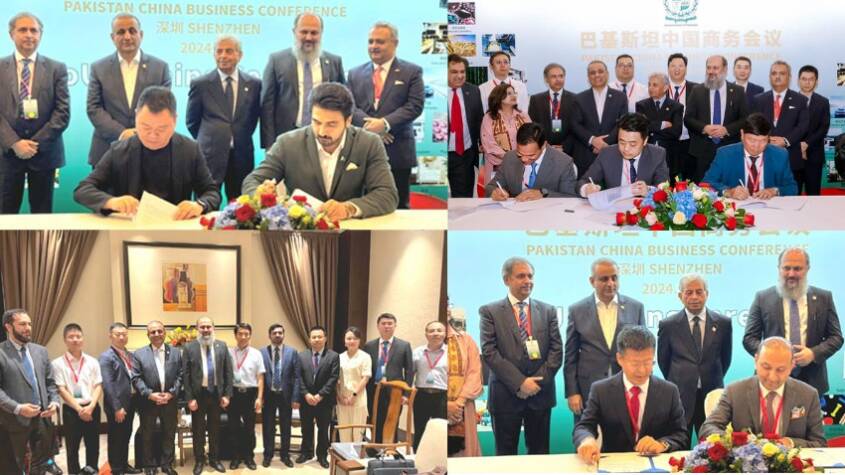32 MoUs signed at Pak-China Business Forum in Shenzhen
Thirty-two memorandums of understanding were signed at the Pakistan-China Business Forum in Shenzhen to boost bilateral trade and investment relations between the two countries. Minister for Privatization and Board of Investment, Abdul Aleem Khan, in a statement said 500 Chinese companies and 100 companies from Pakistan participated in the forum.
Minister for Privatization and Board of Investment, Abdul Aleem Khan on Wednesday hailed the fruitful outcome of the recent Pakistan-China Business Conference held in Shenzhen, China, emphasizing the significant strides made in bolstering bilateral trade relations between the two countries.
Speaking to the media in China, he expressed satisfaction over the robust participation of 500 Chinese and 100 Pakistani companies in the conference, deeming it as an encouraging sign for future collaborations.
He highlighted the signing of 32 Memorandums of Understanding (MoUs) during the conference, noting that these agreements would serve to fortify Pak-China trade ties across various sectors including agriculture, fertilizer, IT, mobile, and pharmaceuticals.
The federal minister underscored the practical promotion of business-to-business activities through these agreements, affirming that such initiatives would facilitate direct exports from Pakistan to China and foster long-term partnerships between the two nations. He emphasized the importance of smooth communication in business dealings, emphasizing its role in nurturing trust and fostering cooperation.
He lauded the exceptional significance of the Pakistan-China Business Conference, noting its instrumental role in advancing the vision of cooperation between the two countries, particularly in the realm of economic development. He commended Prime Minister Imran Khan’s commitment to enhancing cooperation with China, asserting that significant progress had been made in this regard.
Abdul Aleem Khan said that thirty two memorandum of understanding (MoUs) were signed at the Pakistan-China Business Forum held in Shenzhen, China which would help boost bilateral trade and investment relations between the two countries.
He mentioned that 500 Chinese companies and 100 companies from Pakistan participated in the forum. Additionally, successful bilateral negotiations were conducted with Chinese companies, said a press release received here today.
The minister highlighted that during the Prime Minister’s current visit to China, detailed discussions were held regarding the promotion of business activities between the two countries.
Ministers for the Board of Investment and Commerce also held meetings with chief executive officers of major Chinese companies.
Abdul Aleem Khan emphasized that this was an excellent opportunity for the Pakistani business community to encourage Chinese investments, ultimately boosting exports. He indicated that this conference provided a platform for long-term business ties between the two sides.
In discussions with business entrepreneurs, he assured that Pakistan would fully support Chinese companies in establishing business activities. Moreover, the private sector will have complete freedom to invest in energy, infrastructure development, farming, engineering construction, and logistics sectors.
He noted the encouraging participation of prominent Pakistani businessmen in a visit to China, mentioning significant investment opportunities in various sectors including the hotel industry, tourism, culture, sports goods, textile, decoration industry, and airport designing.
Abdul Aleem Khan emphasized Pakistan’s full potential and abundant natural resources, stating that promoting business activities on a large scale would drive the economy and generate employment opportunities for the youth.
The minister also conducted consultative meetings with important Chinese business groups, discussing bilateral proposals and finalizing plans to further enhance cooperation.
Chinese envoy Zhao Shiren urges students to uphold integrity and strengthen China-Pakistan ties
LAHORE:The Consul Generals from several countries and other distinguished guests attended …











